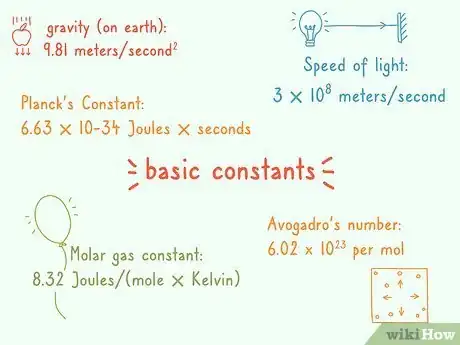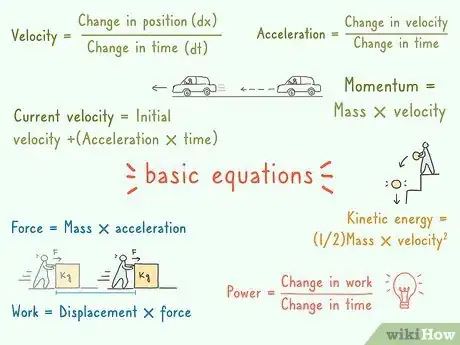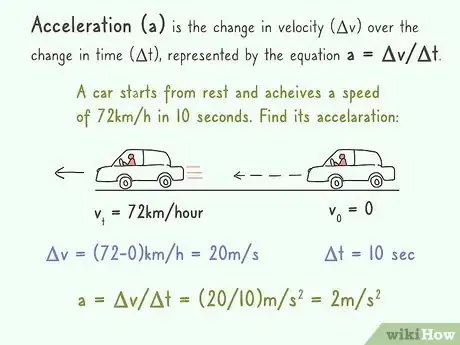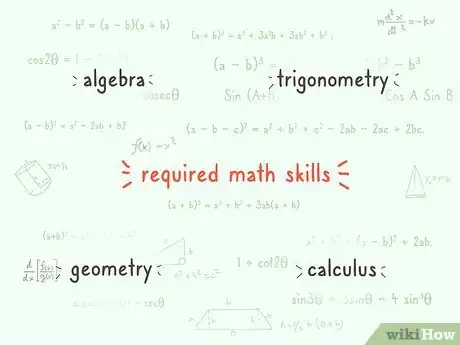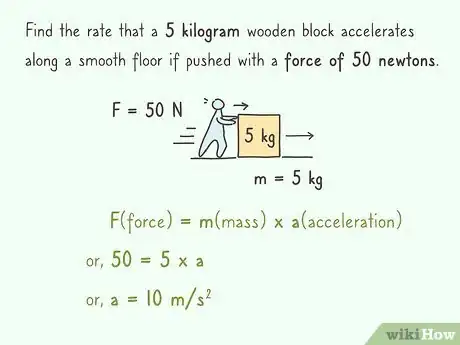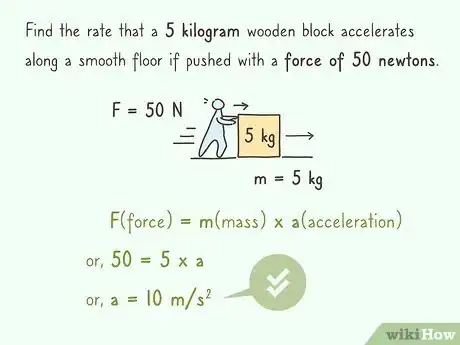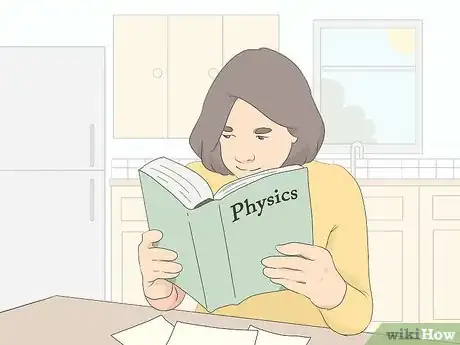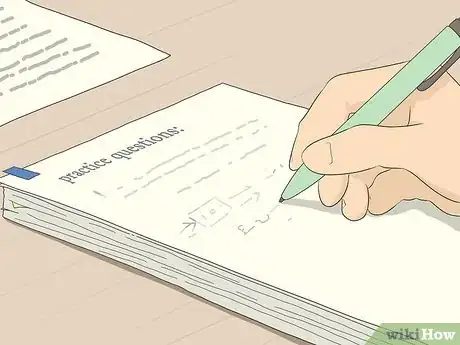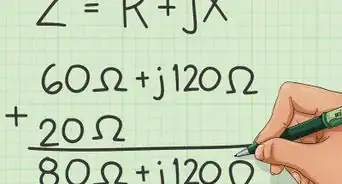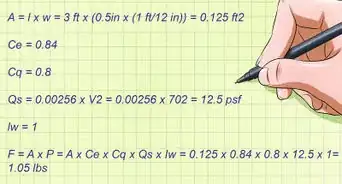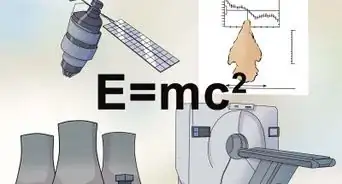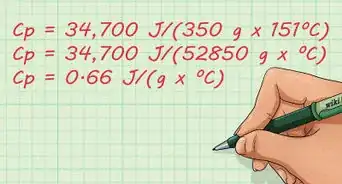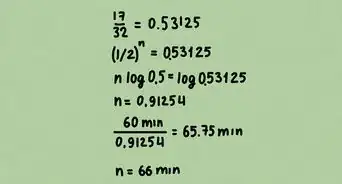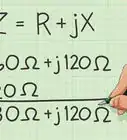This article was co-authored by Sean Alexander, MS. Sean Alexander is an Academic Tutor specializing in teaching mathematics and physics. Sean is the Owner of Alexander Tutoring, an academic tutoring business that provides personalized studying sessions focused on mathematics and physics. With over 15 years of experience, Sean has worked as a physics and math instructor and tutor for Stanford University, San Francisco State University, and Stanbridge Academy. He holds a BS in Physics from the University of California, Santa Barbara and an MS in Theoretical Physics from San Francisco State University.
There are 7 references cited in this article, which can be found at the bottom of the page.
wikiHow marks an article as reader-approved once it receives enough positive feedback. This article received 73 testimonials and 90% of readers who voted found it helpful, earning it our reader-approved status.
This article has been viewed 614,873 times.
For some lucky individuals, being good at physics comes naturally. For the rest of us, however, getting a good grade in physics requires a significant amount of hard work. Luckily, by learning important foundational skills and practicing often, almost anyone can master their physics material. However, even more important than getting a good grade is the fact that a better understanding of physics may shed light on some of the seemingly mysterious forces that govern the way the world works.
Steps
Understanding Basic Physics Concepts
-
1Memorize basic constants. In physics, certain forces, like the accelerating force of gravity on earth, are assigned mathematical constants.[1] This is simply a fancy way of saying that these forces are usually represented as the same number regardless of where or how they're used. It's a smart idea to memorize the most common constants (and their units) — often, they won't be provided on tests. Below are a few of the most frequently-used constants in physics:
- Gravity (on earth): 9.81 meters/second2
- Speed of light: 3 × 108 meters/second
- Molar gas constant: 8.32 Joules/(mole × Kelvin)
- Avogadro's number: 6.02 × 1023 per mole
- Planck's Constant: 6.63 × 10-34 Joules × seconds
-
2Memorize basic equations. In physics, the relationships between the many different forces acting in the universe are described with equations. Some of these equations are very simple, while some are enormously complex. Having the simplest equations memorized and knowing how to use them is critical when tackling both simple and complex problems. Even difficult and confusing problems are often solved by using several simple equations or modifying these simple equations so that they fit new situations. These basic equations are the easiest part of physics to learn, and if you know them well, the odds are that you will at least know some part of every complex problem you face. Just a few of the most important equations are:[2]
- Velocity = Change in position/Change in time (v=dx/dt)
- Acceleration = Change in velocity/Change in time (a=dv/dt)
- Current velocity = Initial velocity + (Acceleration × time) (v=v0+a×t)
- Force = Mass × acceleration (F=m×a)
- Kinetic energy = (1/2)Mass × velocity2 (K=(1/2)m×v)
- Work = Displacement × force (W=d×F)
- Power = Change in work/Change in time (P=dW/dt)
- Momentum = Mass × velocity (p=m×v)
Advertisement -
3Study the derivation of basic equations. Having your simple equations memorized is one thing — understanding why these equations work is another entirely. If you can, take time to learn how each basic physics equation is derived. This gives you a much clearer understanding of the relationship between the equations and makes you a more versatile problems-solver. Since you essentially understand how the equation "works", you'll be able to use it much more effectively than if it's simply a rote, memorized string of characters in your mind.
- For example, let's look at a very simple equation: Acceleration = Change in velocity/Change in time,[3] or a = Delta(v)/Delta(t). Acceleration is the force that causes an object's velocity to change. If an object has an initial velocity of v0 at time t0 and a final velocity of v at time t, the object can be said to accelerate as it changes from v0 to v. Acceleration can't be instantaneous — no matter how fast it occurs, there will be some time difference between when the object is traveling at its initial velocity and when it reaches its final velocity. Thus, a = (v - v0/t - t0) = Delta(v)/Delta(t).
-
4Learn the math skills required to do physics problems. Math is often said to be "the language of physics." Becoming an expert in the fundamentals of math is a great way to improve your ability to master physics problems. Some complex physics equations even require specialized mathematical skills (like taking derivatives and integrals) to be solved. Below are just a few math topics that can help you perform physics problems, in order of complexity:
- Pre-algebra and algebra (for basic equations and "find the unknown" problems)
- Trigonometry (for force diagrams, rotation problems, and angled systems)
- Geometry (for problems dealing with area, volume, etc.)
- Precalculus and calculus (for taking derivatives and integrals of physics equations — usually advanced topics)
- Linear algebra (for calculations involving vectors — usually advanced topics).
Using Score-boosting Strategies
-
1Focus on the important information in every problem. Physics problems often contain "red herrings" — information that isn't needed to solve the problem. When reading a physics problem, identify the pieces of information that you are given, then determine what you are trying to solve for.[4] Write the equation(s) you'll need to solve the problem, then assign each piece of information in the problem to the appropriate variables. Ignore information that isn't needed, as this can slow you down and make the correct path for solving the problem more difficult to find.[5]
- For example, let's say that we need to find the acceleration that a car experiences as its velocity changes over two seconds. If the car weighs 1,000 kilograms, starts moving at 9 m/s and ends at 22 m/s, we can say that v0 = 9 m/s, v = 22 m/s, m = 1,000 t = 2 s. As noted above, the standard acceleration equation is a = (v - v0/t - t0). Note that this doesn't take the object's mass into account, so we can ignore the fact that the car weighs 1,000 kg.
- Thus, we would solve as follows: a = (v - v0/t - t0) = ((22 - 9)/(2 - 0)) = (13/2) = 6.5 m/s2
-
2Use the correct units for every problem. Forgetting to label your answer or using the incorrect units is a sure-fire way to miss easy points. To make sure you get full credit for whatever problem you're doing, be sure to label your answer with its correct units based on the type of information being expressed.[6] Some of the most commonly-used units for common measurements in physics are listed below — note that, as a general rule, physics problems almost always use metric/SI measurements:[7]
- Mass: Grams or kilograms
- Force: Newtons
- Velocity: meters/second (sometimes kilometers/hour)
- Acceleration meters/second2
- Energy/Work: Joules or kilojoules
- Power: Watts
-
3Don't forget small details (like friction, drag, etc.). Physics problems are usually models of real-world situations — that is, they simplify the actual way that things work to make the situation easier to understand. Sometimes, this means that forces that can change the outcome of a problem (like, for instance, friction) are deliberately left out of the problem. However, this is not always the case. If these minor details aren't explicitly left out of the problem and you have enough information to account for them in your answer, be sure to include them for the most accurate answer.[8]
- For example, let's say that a problem asks you to find the rate that a 5 kilogram wooden block accelerates along a smooth floor if pushed with a force of 50 newtons. Since F = m × a, the answer may seem to be as simple as solving for a in the equation 50 = 5 × a. However, in the real world, the force of friction will act against the forward motion of the object, effectively reducing the force it's being pushed with. Leaving this out of the problem will result in an answer that has the block accelerating slightly faster than it actually would.
-
4Double-check your answers. An average-difficulty physics problem can easily involve a dozen or so mathematical calculations. An error in any of these can cause your answer to be off, so pay close attention to your math as you work and, if you have time, double-check your answer at the end to make sure your math "adds up."[9]
- While simply re-doing your work is one way to check your math, you may also want to use common sense to relate your problem to real life as a way of checking your answer. For example, if you're trying to find the momentum (mass × velocity) of an object moving in the forward direction, you wouldn't expect a negative answer, since mass can't be negative and velocity is only negative if it's in the "negative" direction (i.e., opposite the "forward" direction in your frame of reference). Thus, if you get a negative, answer, you've probably made an error in your calculations somewhere along the line.
Doing Your Best in Physics Class
-
1Read the topic before the lecture. Ideally, you shouldn't come across new physics concepts for the very first time in class. Instead, try, reading upcoming lessons in your textbook the day before they'll be covered in class.[10] Don't fixate on the precise mathematics of the topic — at this stage, focus on grasping the general concepts and trying to grasp what is being discussed. This will give you a solid foundation of knowledge upon which you'll be able to apply the mathematical skills you'll learn in class.
-
2Pay attention during class. During class, the teacher will explain the concepts you encountered in your pre-reading and clarify any areas of the material that you don't understand well. Take notes and ask plenty of questions. Your teacher will probably go through the mathematics of the topic. When he or she does so, try to have a general idea of "what's happening" even if you don't remember the exact derivations of each equation — having this sort of "feel" for the material is a huge asset.[11]
- If you have lingering questions after class, talk to your teacher. Try to make your questions as specific as possible — this shows the teacher that you were listening. If the teacher isn't busy, she or he will probably be able to schedule an appointment to go over the material with you and help you understand it.
- You could even ask your professor or teacher if they would be willing to let you record the lectures so that you can listen to them again later. This would allow you to ask for clarification on anything that is still unclear to you after re-listening to the lecture.
-
3Review your notes at home. To finish off the task of studying and polish your physics knowledge, take a few moments to go over your notes as soon as you have a chance at home. Doing this will help you retain the knowledge you've gained from the day's class. The longer you wait after you take your notes to review them, the more difficult to remember they will be and the more "foreign" the concepts will seem, so be proactive and cement your knowledge by reviewing your notes at home.
-
4Solve practice questions. Just like math, writing, or programming, solving physics problems is a mental skill. The more you use this skill, the easier it will become. If you're struggling with physics, be sure to get plenty of practice solving problems. This will not only prepare you for exams but will help make many concepts clearer as you make your way through the material.[12]
- If you're not happy with your grade in physics, don't be content to simply use the problems assigned in your homework for practice. Make the extra effort to complete problems you wouldn't normally encounter — these can be problems in your textbook that aren't assigned to you, free problems online, or even problems in physics practice books (usually sold at academic bookstores).
-
5Use the sources of help that are available to you. You don't have to try to endure a difficult physics course by yourself — depending on your schooling situation, there may be literally dozens of ways to get help. Seek out and use any help resources you need to get a better understanding of your physics material. Though some help resources can cost money, most students have at least a few free options available to them. Below are just a few ideas of who and what to seek out if you need physics help:[13]
- Your teacher (via after-school appointment)
- Your friends (via study groups and homework sessions)
- Tutors (either privately-hired or as part of a school program)
- Third-party resources (like physics problem books, educational sites like Khan Academy, and so on)
Expert Q&A
Did you know you can get premium answers for this article?
Unlock premium answers by supporting wikiHow
-
QuestionDo you really need to double-check every answer?
 Sean Alexander, MSSean Alexander is an Academic Tutor specializing in teaching mathematics and physics. Sean is the Owner of Alexander Tutoring, an academic tutoring business that provides personalized studying sessions focused on mathematics and physics. With over 15 years of experience, Sean has worked as a physics and math instructor and tutor for Stanford University, San Francisco State University, and Stanbridge Academy. He holds a BS in Physics from the University of California, Santa Barbara and an MS in Theoretical Physics from San Francisco State University.
Sean Alexander, MSSean Alexander is an Academic Tutor specializing in teaching mathematics and physics. Sean is the Owner of Alexander Tutoring, an academic tutoring business that provides personalized studying sessions focused on mathematics and physics. With over 15 years of experience, Sean has worked as a physics and math instructor and tutor for Stanford University, San Francisco State University, and Stanbridge Academy. He holds a BS in Physics from the University of California, Santa Barbara and an MS in Theoretical Physics from San Francisco State University.
Physics Tutor
-
QuestionWhy are physics problems so complicated?
 Sean Alexander, MSSean Alexander is an Academic Tutor specializing in teaching mathematics and physics. Sean is the Owner of Alexander Tutoring, an academic tutoring business that provides personalized studying sessions focused on mathematics and physics. With over 15 years of experience, Sean has worked as a physics and math instructor and tutor for Stanford University, San Francisco State University, and Stanbridge Academy. He holds a BS in Physics from the University of California, Santa Barbara and an MS in Theoretical Physics from San Francisco State University.
Sean Alexander, MSSean Alexander is an Academic Tutor specializing in teaching mathematics and physics. Sean is the Owner of Alexander Tutoring, an academic tutoring business that provides personalized studying sessions focused on mathematics and physics. With over 15 years of experience, Sean has worked as a physics and math instructor and tutor for Stanford University, San Francisco State University, and Stanbridge Academy. He holds a BS in Physics from the University of California, Santa Barbara and an MS in Theoretical Physics from San Francisco State University.
Physics Tutor They're difficult because so many physics problems require multiple steps that you have to follow, and even the tiniest deviation from a step can cause your answer to be off. This is why it's so important that you understand the underlying principles behind why you're doing what you're doing! It's a lot harder to arrive at the right conclusion if you aren't aware of how you're navigating the problem.
They're difficult because so many physics problems require multiple steps that you have to follow, and even the tiniest deviation from a step can cause your answer to be off. This is why it's so important that you understand the underlying principles behind why you're doing what you're doing! It's a lot harder to arrive at the right conclusion if you aren't aware of how you're navigating the problem. -
QuestionIs physics really that difficult?
 Sean Alexander, MSSean Alexander is an Academic Tutor specializing in teaching mathematics and physics. Sean is the Owner of Alexander Tutoring, an academic tutoring business that provides personalized studying sessions focused on mathematics and physics. With over 15 years of experience, Sean has worked as a physics and math instructor and tutor for Stanford University, San Francisco State University, and Stanbridge Academy. He holds a BS in Physics from the University of California, Santa Barbara and an MS in Theoretical Physics from San Francisco State University.
Sean Alexander, MSSean Alexander is an Academic Tutor specializing in teaching mathematics and physics. Sean is the Owner of Alexander Tutoring, an academic tutoring business that provides personalized studying sessions focused on mathematics and physics. With over 15 years of experience, Sean has worked as a physics and math instructor and tutor for Stanford University, San Francisco State University, and Stanbridge Academy. He holds a BS in Physics from the University of California, Santa Barbara and an MS in Theoretical Physics from San Francisco State University.
Physics Tutor
References
- ↑ https://pdg.lbl.gov/2018/reviews/rpp2018-rev-phys-constants.pdf
- ↑ https://www.thamesmead.surrey.sch.uk/wp-content/uploads/2019/09/AQA-Physics-Equations.pdf
- ↑ https://www.physicsclassroom.com/class/1DKin/Lesson-1/Acceleration
- ↑ Sean Alexander, MS. Physics Tutor. Expert Interview. 14 May 2020.
- ↑ https://www2.oberlin.edu/physics/dstyer/StudyTips.html
- ↑ Sean Alexander, MS. Physics Tutor. Expert Interview. 14 May 2020.
- ↑ https://physics.tamu.edu/academics/current-undergraduates/study/
- ↑ https://physics.tamu.edu/academics/current-undergraduates/study/
- ↑ Sean Alexander, MS. Physics Tutor. Expert Interview. 14 May 2020.
About This Article
To do well in physics, start by reading the topic before the lecture, focusing on the general concepts to get a basic idea of what will be discussed in class. During the lecture, take detailed notes and ask a lot of questions to help clarify things you don’t understand very well. Next, memorize the basic constants that never change, such as the speed of light, as well as basic equations, like how to measure velocity. Additionally, use online study resources like the Khan Academy, or try forming study groups with other students. To learn more, like how to use the correct units for every physics problem, read on!
